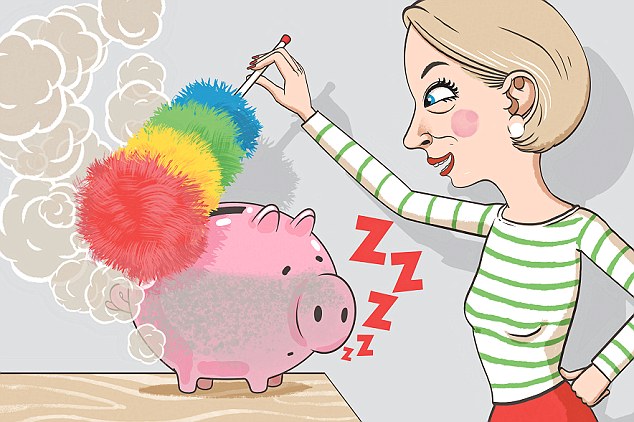Stock market investment can seem scary and complicated, particularly if you have only ever used ordinary savings accounts at banks and building societies.
But if you’re saving for more than five years, for example for retirement, you’ll be missing out on huge returns by keeping your money in cash.
Need convincing? If you had put £15,000 into the average savings account a decade ago, your money would have grown to just £15,478 — a return of 3.2 per cent in total.
If you had invested the same amount into the FTSE All Share index, you would have almost doubled your money to £29,713, according to calculations by investing firm Fidelity.


If you had put £15,000 into the average savings account a decade ago, it would have grown to £15,478. The same amount put into the FTSE All Share index would have grown to £29,713
So today, Money Mail’s must-read Spring Clean Your Finances series will show you how to master the stock market.
RELATED ARTICLES
Previous
1
Next

Should I invest in an Isa or top up my pension? What’s the…

How to get into investing with a sensible online stocks and…

Should you grab a fixed or variable savings rate deal?…

Are you on track for a rich retirement? How to work out if…
Share this article
Share
HOW THIS IS MONEY CAN HELP
How to find and compare the best online broker or DIY investing platform
THE SECRET STRATEGY
Most inexperienced investors have three big fears: what if a sudden stock market crash destroys my nest egg? Which shares should I pick? When should I buy and sell?
Do not panic. You can beat all these potential pitfalls with a simple trick. It’s used by all the pros and if you follow the rules, you’ll not go far wrong.
The secret is this: invest regularly in a range of funds managed by a stock-picker with proven expertise and ignore the ups and downs in the market. Here we explain the method in three simple steps.
STEP 1
Work out how much you have in savings, what you can afford to put aside and how long you’re investing for.Â
If you don’t feel you can invest the money for at least five years — or can’t face the prospect of being left with less than you started with — investing isn’t for you. You’ll find heaps of information about less risky savings accounts on the following pages.
The funds you must dump nowÂ
Tinkering too much with your investments is never a good idea. The experts say you are likely to do more harm than good by chopping and changing your fund selections every year.
But keep an eye out for serial under-performers — and be ruthless when the time comes. Investment website Bestinvest publishes an annual list of ‘dog’ funds that are failing to keep up with their rivals.
The largest fund on its list this year is Aberdeen Asia Pacific Equity, which controls nearly £1.3 billion of savings and has grown by 5.5 per cent over the past year.Â

The UK-focused funds in its report include Aberdeen UK Equity, which has lost 1.52 per cent of its value over the past year, and Aberdeen UK Equity Income, which is down 6.4 per cent in that time.
Among the worst-ranked global funds were Templeton Growth, down 0.52 per cent in a year, which has returned 2.53 per cent over the past 12 months.
Generally speaking, experts say you should give fund managers at least three years to prove their mettle against their rivals, as all professional stock-pickers are prone to temporary dips in form.
STEP 2
Next, set up a direct debit for the same amount each month going into a fund supermarket.
Companies such as Hargreaves Lansdown, AJ Bell and Bestinvest let you set up regular investment plans from as little as £25 a month.Each month your money is spread across your chosen funds.
Drip-feeding your investments is better than bunging in a lump-sum every now and then, as it minimises the chance of you making a bad decision. Trying to time the market is almost always a mistake.
Fidelity estimates someone who invested £1,000 in the FTSE All Share 30 years ago but missed the ten top-performing days because of bad investment decisions would now have £7,215.
But if you had just left your money in the stock market the entire time it would have grown to £13,491.
Having a regular plan means you still invest money when the market falls, so you buy more shares when they are cheap and fewer when they are more expensive, which boosts returns long-term.